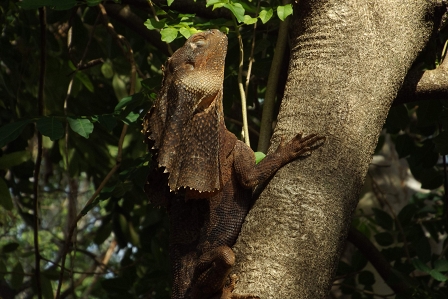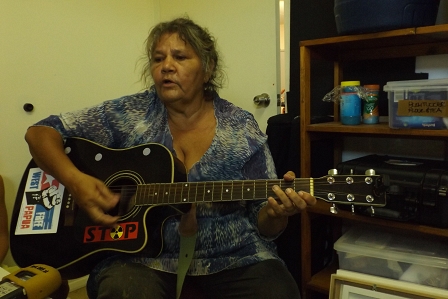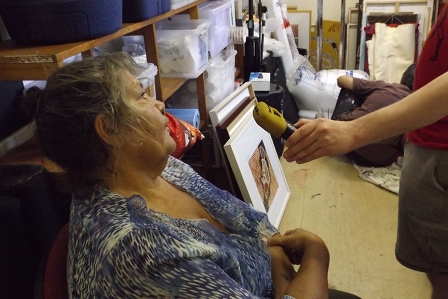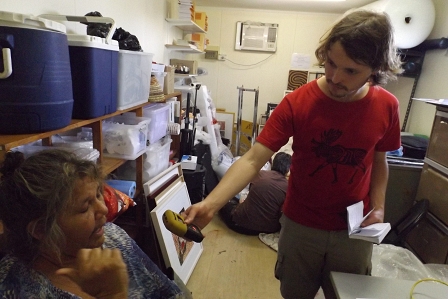Erstellt am: 26. 11. 2016 - 08:00 Uhr
Healing before you need to be healed
Reality Check Special
Listen to a Reality Check Special with Johnny Bliss in an informal chat with the Larrakia artist and activist, Gunluckiinimul (June Mills)
Saturday, November 26th, 12-13, and afterwards seven days on demand.

Johnny Bliss, 2016
Think of Australia.
What do you imagine? Drunk surfers? Weirdos who call each other 'mate' while prying open crocodiles mouths on television? A whole bunch of innocent-looking animals* who can kill you? Vegemite? Sharks?
All of those stereotypes would be appropriate - but they all ignore, essentially, the wallaby in the room.
Australia was already populated before white people came.
For tens of thousands of years, many very different peoples populated the red continent, and lived off the land predominantly either by farming, fishing, or hunting and gathering, depending on in which region they lived.
According to Australian Geographic, Australian Aboriginals arrived from Africa as long ago as 75,000 years ago, and make up one of the longest - if not the longest - continuous cultures on the planet.
Which makes it even more of a tragedy that their numbers were reduced to about sixty thousand from an estimated one million, after European colonialists arrived in the 19th century.
Add to that the cultural genocide perpetuated during the 'Stolen Generations' (see below), and one could understand why many of the survivors might be more than a little traumatized.
* or anywhere in the state of Tasmania, where the aboriginal population has been all but wiped out.
You could easily forget all this, hanging out in metropolitan coastal cities like Sydney or Melbourne*. But if you head inland, or to some of the more remote tropical areas, you will quickly be reminded that colonial Australia has a history, and it's pretty fucking dark.
I myself received my first reminder in the sleepy capital of Australia's Northern Territory, Darwin, a town where indigenous Australians make up nearly ten percent of the population. That might not seem like a lot to you, but in comparison to other heavily urbanized areas, where the percentage seemed to be closer to 0.01%, the difference is huge.
Most of the indigenous Australians I saw in Darwin were hanging out on street corners, or sleeping in doorways. From a European context, that suggested they were doing pretty badly. It is worth noting, however, that our idea of 'civilized' involves slaughtering native people everywhere we have found them, and stealing their land. Whereas aboriginal civilizations in Australia seemed to be doing just fine living off their own land for the last gazillion years. So it is entirely possible that our perceptions are skewed.
* Larrakia being the dominant indigenous people in the Darwin area
Downtown, I asked around to see if anyone knew of an Aboriginal activist who might be willing to talk to me. I was directed to the offices of an organization called Larrakia Nation*, run by 75% Aboriginal people.
It is there that I met June Mills: Gunluckiinimul, to use her Larrakia name.

Johnny Bliss, 2016
Although she agreed pretty quickly to have a chat with me when I turned up unannounced that sweaty tropical afternoon, I had the feeling that she viewed me with suspicion, at first. As well she might.
Over the course of two long hours of conversation, however, I am pleased to report that some of those shields went down, and we covered a lot of topics, including many that I never even imagined we would address.
In short, it stopped being an interview, and started being a conversation.

Johnny Bliss, 2016
Terminologies & Treaties
Not being from the local culture, I was unsure of which terms I should use to describe indigenous or Aboriginal Australians. I thought I would ask her to school me on it. It was a bit of a rough start to our conversation.
"Nothing that anybody calls us is appropriate. We still have our proper names, which is Larrakia. Aboriginal or indigenous, these are not our terms, these are the terms that the oppressors have given us. I don’t have to say I’m an Aboriginal or I’m an indigenous, or whatever terminology you wanna use to diminish my rights to my land. I say to you, no, I’m Larrakia."
Still at a loss for inoffensive terminology, I pressed on: in which areas had consensus been found? Surely, after nearly two centuries of hardship, colonialist Australia and its native population had agreed to some treaties?
"No, and that’s a source of pride for our people, because once you go into a treaty with the oppressors, of course, you’re totally diminished, and you still don’t have any control, so we definitely don’t want any treaty."
Okay. Well then, what positive steps could the government take, to improve the situation for Larrakia and, er, other such native groups?
"Decolonize now. Get off our land."
Of course, in a sense this was justified, but it was also an entirely uncompromising position. I sat there, speechless, for a long moment, unsure of where to take the conversation from here.
She must have sensed this, for she continued, "It sounds extreme, doesn’t it? But you know, they came here, they can go back! We didn’t go to their country. At the end of the day, we come from [this] land, and we know how to survive in this land. You can’t. And we’re not going to deal over our land. We are not going to settle for a couple dollars for a bit of soil. No. That’s YOUR game. Not ours." She hesitated. "Sorry, I'm not referring to YOU..."
We both laughed. The tension was broken.

Johnny Bliss, 2016
On the Stolen Generations, and the damage done
* if we're going to call a spade a spade
If you've never heard of it, the Stolen Generations were an (especially) shameful period in Australian history, wherein Aboriginal children all around the country were stolen away from their families, kidnapped in fact*, and sent to foster homes and institutions which would convert them to Christianity and teach them to forget their own cultural practices.
This practice started in the early 1900s and only ended as late as 1970.
Understandably, a lot of people are still struggling with this today.
"I look at it as part of the overall plan, to take our children, to take their language… that was a major thing! You weren’t allowed to speak your language. You weren’t allowed your cultural practices. You weren’t allowed to be with your family. The end result was, you didn’t know who you was, you didn’t know where you came from, pretty much nothing. And along with all of that, pretty much the whole kaboodle, was rape. [...] If you can rape a child when it’s two or three, that person, when it grows up, has so much problems, he’s not going to be able to fight or stand up for himself when he’s a grown man then, can he? They trained them… to be slaves, basically. So they grew up and they could work for the white families."
On Incarceration & Homelessness
"We’re one percent of the population, right? Probably less than one percent now, of Australia. You go to the jails here, we make up eighty to ninety percent of the jail. And for silly stuff! Like they’ll get fined for sleeping in a public place, or they’ll get fined for loitering; but then, I might be standing around because I don’t actually have a house, or an address.
"The only thing they know to do is go to the common places: the bank, or the hospital, or the shop, whatever! But a policeman comes along, [and thinks] 'oh, that’s loitering. Here you go.' Every day it’s like that. Our people’s wallets and bags are full of fines.
"And then guess what? They don’t pay them. They could speak up to six different languages before they learn English. Probably can’t even read English, or probably can’t even read to pay that piece of paper. 'What is that piece of paper? Oh, it’s just a piece of paper'… until BANG! You’re arrested and you’re going to jail [because of] non-payment of fines! So our people are in jail, not for being criminal, just for being…"
On the development of her own artwork
"When they took our children, they shaved their heads, and they just dressed them in rags. And [so] I made a hundred baby outfits, which give back culture and dreaming and story and law and all that. Because if we had our beautiful children, we wouldn’t shave their heads and tell them not to sing a song, or not to dance, or not to … you know? So this making of the clothes was like, this is how we would treat our beautiful children.
"Because I wanted my mom and my other families to know what I was doing, I made this page on Facebook, A Memorial to Stolen Children.
"Now, the funny thing is, when I made that page, my mum still didn’t get to use it, because she doesn’t know how to use internet. The funny thing is, I would get messages from all around Australia, people [saying] 'Oh can we buy them? Can we…?' I [said], 'No, they’re not for sale!'. And then my mum goes to me, 'What are you going to do with them?' 'I don’t know!' There was no plan, there was just like, I’m doing this, and I did it."
On Dreaming & Healing
A very important concept for a lot of Aboriginal communities in Australia is the concept of a 'Dreaming', which is actually an imperfect translation of something we do not have in English.
You could say it's a mixture of an origin story, rule of law explained through folklore and mythology, and a religious communion. (Or you could decide not to listen to the white dude trying to explain another person's culture, and instead let Gunluckiinimul explain in her own words.)
"It’s like a totem. Our tribe will have our spirit that we affiliate with. With the Larrakia people, it’s a Crocodile. We've got a dreaming that we’re born with. When you’re in your mother’s womb, there is a spirit that will come to your mother that becomes your Dreaming, your personal one. So me and my brothers and sisters, even though we’re all Crocodiles through the Larrakia side, individually we all have our own dreamings. Like I am a Preying Mantis. And then, when you go through ceremony, you will get another dreaming, which will be a name-dreaming.
"Because a lot of our people are a bit lost, they may not necessarily know where they come from. Part of my healing may be, 'well, we're gonna find where you come from. We gonna find what your dreaming is'. I believe in healing before we have to heal. I don’t want my child, or anybody’s child, to grow up in emotional, spiritual, cultural pain. That’s why children are killing themselves, amongst other things. So my idea about us healing is, I’ll build that kid up strong, before he gets to the point where he wants to string himself up, or herself up. I teach ‘em about country! I teach ‘em about who they are! You build their strength. See, they’re the next generation, they’re the future! Not us, we all on our way out! So build the babies up strong.
"And that’s the healing before you need to be healed."

Johnny Bliss, 2016
FM4 Reality Check Special on Saturday, November 26th
Listen to a Reality Check Special with Johnny Bliss in an informal chat with the Larrakia artist and activist, Gunluckiinimul (June Mills). Saturday, November 26th, 12-13, and afterwards seven days on demand.
If you miss the program, you can still stream it via the Reality Check podcast or at fm4.ORF.at/7tage.


